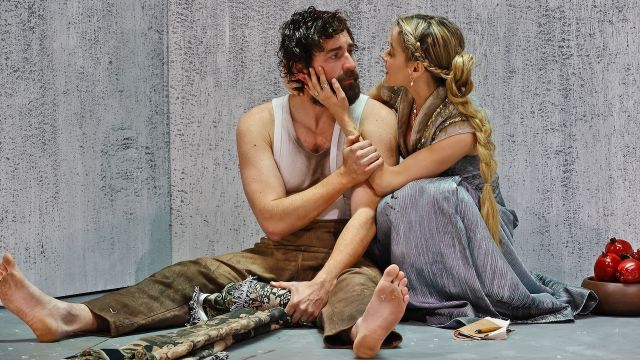Macbeth (an undoing)
In this adaptation of Shakespeare’s ‘Scottish play’ (familiarity with the original is not strictly necessary), Lady Macbeth (Bojana Novakovic) is the protagonist: the tale is told from her point of view. As in Shakespeare’s play, she urges, challenges, and emotionally blackmails Macbeth to murder King Duncan (Jim Daly). From that point, it is Lady Macbeth who drives the action, and it is Macbeth himself (Johnny Carr) who declines into helpless madness. In essence, Zinnie Harris’ adaptation is about power and who has it. In a sense, Macbeth (an undoing) is a ‘what if… play.
In an interview (The Weekend Australian Review 13-14 July) Harris says, ‘I’ve been interested in working with classic texts which are often written by men, long deceased men, who have a female character that I think is either misunderstood or underwritten. I try to reframe the story from that perspective in order to challenge the orthodoxy around the character of the woman.’
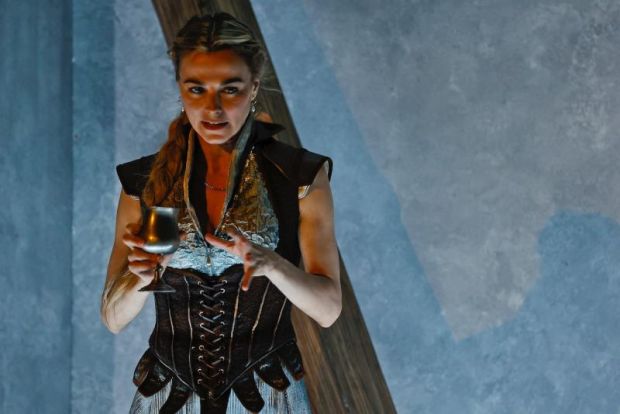
That project can be seen in Macbeth (an undoing). Why not tell the story from Lady Macbeth’s point of view? After having urged her husband to murder – in the most powerful and chilling terms – and making excuses for his erratic behaviour, Shakespeare sidelines her (she’s somewhere in the castle, we assume, but doing what?) until she reappears as a demented sleepwalker, wracked by guilt. Shakespeare even has her die off stage. It’s clear that her primary aim is to make Macbeth king, but does she have anything else in mind for Scotland? Does she attempt to prop up the depressed and debilitated Macbeth – the man on whom she pinned her hopes? And why in the end, does she go mad? Shakespeare says guilt. But it could as well be her own isolation and loneliness as Macbeth withdraws into indifference (‘She would have died hereafter…’).
Answers to such questions might be fascinating (though not for Shakespeare) but they would leave Lady Macbeth still a reactive medieval woman character. Harris doesn’t want that. She wants her protagonist to be a protagonist and to be empowered. What we see on stage goes beyond a switch of point of view. Adaptation becomes rewrite and Harris goes well beyond, say, Simon Stone’s ‘after’ Ibsen, or ‘after’ Lorca.
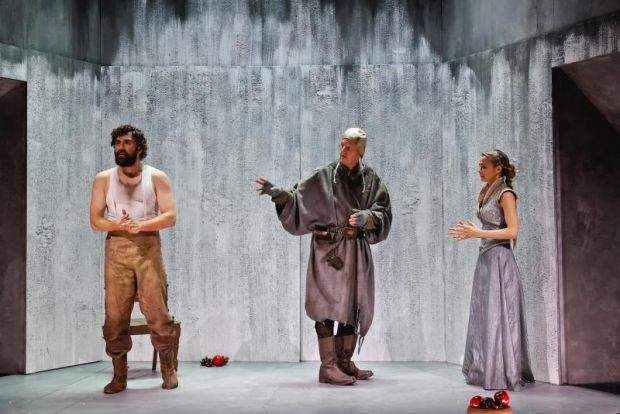
In Rosencrantz and Guildenstern are Dead, Tom Stoppard reframes Hamlet from the point of view of the two hapless courtiers employed to spy on the eponymous hero. Stoppard doesn’t rewrite Hamlet – Shakespeare’s story is left intact – he switches point of view and provides a perspective on hapless collateral damage.
But Harris doesn’t seem to quite decide what sort of play this is. She wants to reframe female characters who have been ‘misunderstood or underwritten’, but she scarcely makes Lady Macbeth a more complex character, despite giving her a female friend/confidante ‘Isobel’ Macduff (Jessica Clarke). A nice touch – especially when given warmth and substance in Clarke’s performance – but in the end does it matter? It’s Lady Macbeth, of course, who orders her murdered force majeure. As for the witches, they lose their spooky hypnotic quality – although Natasha Herbert as lead witch and castle servant Carlin lifts both characters into spikey, cheeky, entertaining life. (Herbert, really, is the hit of the evening.)
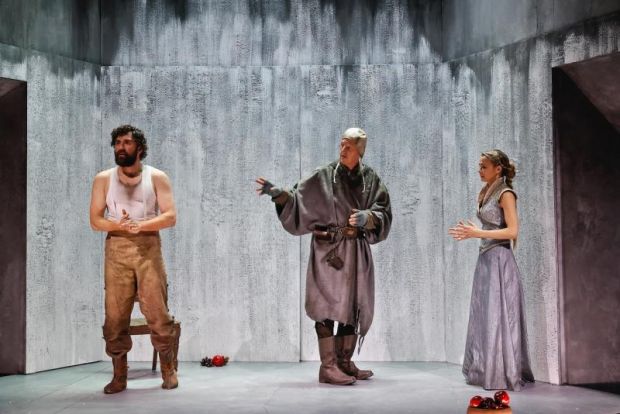
Then there are Harris’ interpolations of contemporary anachronisms (sometimes getting laughs, it must be said) although the effect is often banal. (The Royal Family next door.) There are ‘alienation’ touches, such as Lady Macbeth calling out to stage management staff for a clean skirt and mumbling a complaint that a Velcro fastening would have been easier. Harris keeps pieces of the big speeches, but rearranges them, diminishing their power: before Duncan’s murder Lady Macbeth seems to be convincing herself rather than her husband. Harris’ transfer of power leaves Macbeth with nowhere to go - post regicide Johnny Carr’s Macbeth is a passive character. She gets the big speeches (‘…a tale told by an idiot…’) Most interesting conceptually is Lady Macbeth’s explicit protest to the audience that she is trapped within the medieval world of the original text – which seems tantamount to Harris admitting that her project is foundering – and hence the ragged anticlimactic ending. Novakovic – who can be potent and seductive on screen – is stuck with dutifully trying to be powerful and a firebrand while slogging through her scenes. In Act I she veers close to ambitious nag or bully to a stolid if not dull then weak husband, and in Act II, she’s a harassed executive with unsatisfactory and disrespectful staff.
Played like this, the subsidiary characters overshadow the leads. Jessica Clarke and Natasha Herbert bring oomph to their roles, while Rashid Edward brings cheerful energy and physicality to Banquo. Always strong David Woods excels in three roles, principally Macduff, who’s revealed as the patriarchal power behind the new throne.
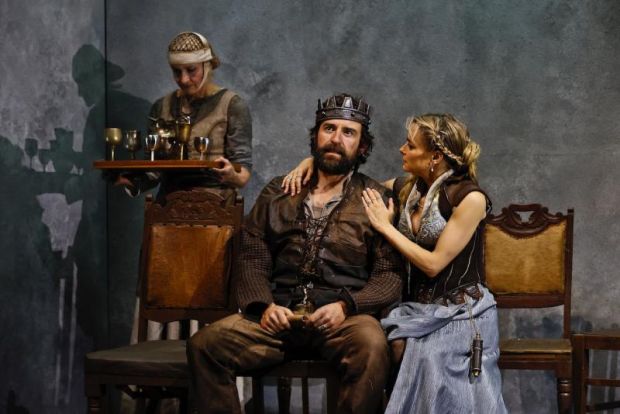
Once again, Malthouse has committed great resources to a play that rests on Shakespeare – and it is not at all without its merits. Dann Barber’s cold, grey, bare yet claustrophobic castle set is superb – and because it is on a revolve, characters can travel through the spaces – and hardworking techies can redecorate rooms as they disappear and reappear. Amelia Lever-Davidson’s lighting works beautifully with Barber’s set, rippling over rooms and scenes and mood changes. And with effects that could work just as well with the original play, Jethro Woodward’s eerie sound design enhances the uneasy ambience with strange knockings, the rustle of birds’ wings, the creak of the encroaching forces.
Am I asking for a different play? Well, I suppose I am – a play that achieves Harris’ own aims. Although there’s no denying much of my audience was enthralled, I kept asking ‘Why?’ Or wondering, ‘Is there a point to this?’ Clearly, Zinnie Harris thinks so – and has said so - but the result feels self-conscious and rather muddled.
Michael Brindley
Photographer: Jeff Busby
Subscribe to our E-Newsletter, buy our latest print edition or find a Performing Arts book at Book Nook.

